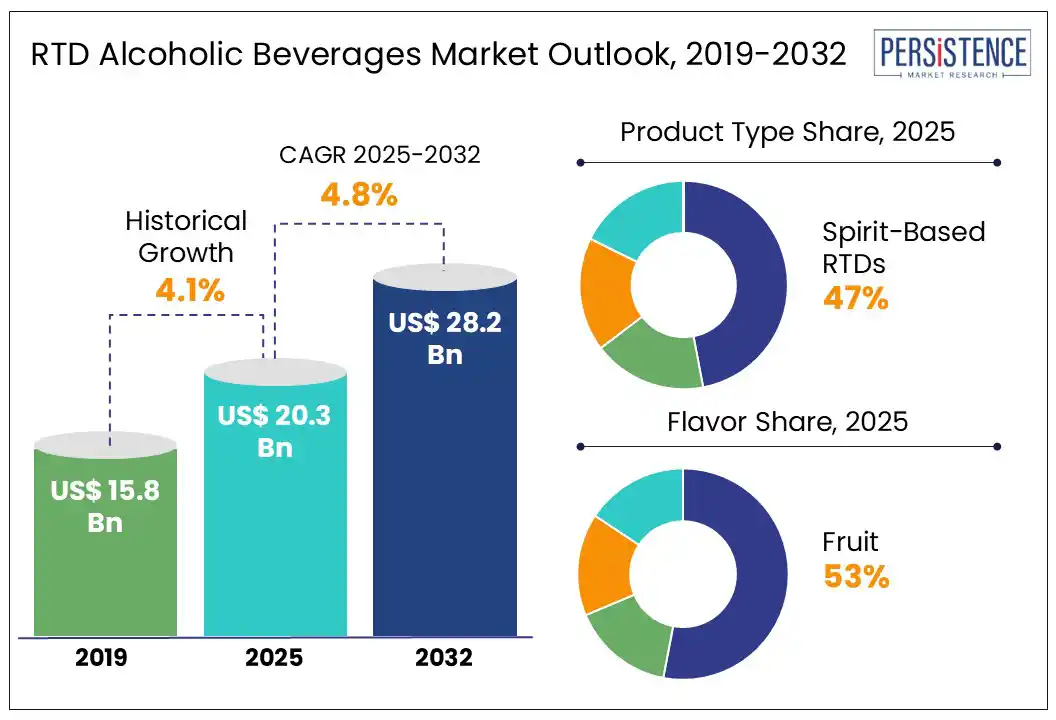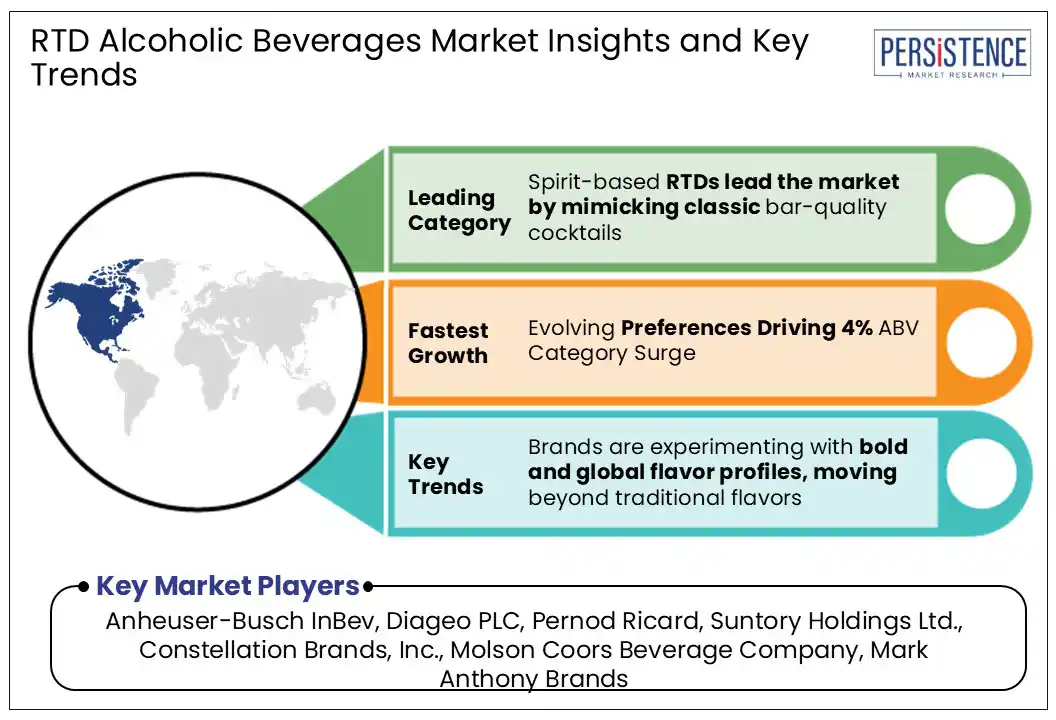ID: PMRREP31198| 191 Pages | 9 Jul 2025 | Format: PDF, Excel, PPT* | Food and Beverages

The global RTD alcoholic beverages market size is likely to be valued at US$ 20.3 billion in 2025 and is expected to reach US$ 28.2 billion by 2032, growing at a CAGR of 4.8% during the forecast period from 2025 to 2032.
The RTD alcoholic beverages market is undergoing rapid transformation, fueled by lifestyle shifts, flavor innovation, and premiumization, as brands adapt to evolving consumer demand for convenience, authenticity, and health-conscious indulgence in portable formats.

Key Industry Highlights:
|
Global Market Attribute |
Key Insights |
|
Global RTD Alcoholic Beverages Market Size (2025E) |
US$ 20.3 Bn |
|
Market Value Forecast (2032F) |
US$ 28.2 Bn |
|
Projected Growth (CAGR 2025 to 2032) |
4.8% |
|
Historical Market Growth (CAGR 2019 to 2024) |
4.1% |
The swift evolution of today’s fast-paced, “on-the-go” lifestyles is a powerful force driving the explosion of the ready-to-drink (RTD) alcoholic beverages market. Modern consumers prefer convenience and efficiency, and choose the satisfaction of ready-to-enjoy drinks over the labor of cocktail preparation. This craving is perfectly suited for several occasions, from impromptu picnics and beach outings, where quick, convenient purchases drive instant gratification.
RTDs, primarily packaged in portable cans, are tailored for the mobile consumer. They deliver an immediate, no-fuss solution that requires zero preparation or cleanup. Bar-quality RTD drinks offer high convenience for socializing. This seamless convenience resonates deeply with individuals constantly on the go, making RTDs a better companion for today’s dynamic and fast-paced lifestyle.
The disparate and conflicting nature of alcohol laws, tax rates, and labeling standards across various jurisdictions presents a significant challenge for the RTD alcoholic beverages market. Companies face immense complexity in adapting for popular regions. For instance, a brand launching an RTD in the US must contend with vastly different excise taxes: in Washington State, distilled spirits are taxed at an exorbitant $36.55 per gallon, whereas Missouri levies a mere $2.00 per gallon. This profound disparity directly impacts pricing strategies, profitability, and competitive viability. Moreover, beyond taxation, labeling requirements for ABV, ingredients, and health warnings vary which incur costly redesigns and approvals. The legal and fiscal discrepancies create a substantial barrier to entry for new players and limit the scalability and widespread distribution potential for established brands.
A significant opportunity in the RTD alcoholic beverages market lies in the integration of trending functional ingredients that align with wellness-driven consumer preferences. As health-conscious drinkers seek better-for-you alternatives, brands differentiate by offering RTDs infused with adaptogens, probiotics, antioxidants, or botanicals that support vitality and mindful consumption.
For instance, JuneShine, California-based, has successfully tapped into this trend with its hard kombucha, combining alcohol with gut-friendly probiotics and organic ingredients. This functional twist resonates strongly with millennials and Gen Z consumers that prefer natural profiles, and perceived health benefits. RTDs incorporating ingredients such as green tea, ginger, ashwagandha, or CBD can open new product frontiers, particularly in the premium and lifestyle-oriented segments. These innovations also provide a compelling story for marketing and shelf differentiation. As demand for holistic indulgence grows, brands that balance flavor, function, and authenticity stand to capture a loyal base.
Spirit-based RTDs currently command approximately 47% of the market share in 2025, a dominant position driven by their ability to mimic classic bar-quality cocktails with convenience. Consumers are drawn to the authentic taste experience offered by these products, which leverage established spirits such as vodka, tequila, and gin. This allows for a wider array of sophisticated and complex flavor profiles, appealing to consumer base seeking premium options While spirit-based RTDs lead, other categories are also witnessing positive momentum. Malt-based RTDs continue to evolve, offering diverse and innovative flavors, often at accessible price points. Similarly, wine-based RTDs are gaining traction, appealing to consumers looking for lighter, often fruit-forward alternatives with perceived sophistication.
By flavor, fruit-flavored RTDs will likely gain 53% of the market share in 2025. This dominance is attributed to their broad consumer appeal, familiarity, and compatibility with a wide variety of spirits and mixers. 73% of consumers prefer fruit-flavored beverages, which reinforces their central role in driving RTD innovation. From tropical mango and citrus to mixed berries, fruit flavors align well with seasonal trends and offer a refreshing sensory profile that resonates across demographics. Their versatility enables a widespread application in cocktails and hard seltzers, adding to their dominance. Meanwhile, herbal and spiced variants are gaining momentum especially among consumers seeking sophisticated and wellness-inspired alternatives. Spiced RTDs with ginger, cinnamon, or chili infusions cater to adventurous palates, while herbal options such as mint and lemongrass find favor among health-conscious drinkers.

North America holds a 28.6% market share in the RTD alcoholic beverages market as of 2024, driven by rapid lifestyle shifts and evolving consumer preferences. In the U.S., rising health awareness and demand for convenience have made low-calorie, low-sugar, and gluten-free RTDs increasingly popular. American consumers, especially millennials and Gen Z, seek flavor innovation, organic labels, and beverages that align with wellness trends while still delivering premium taste. The U.S. market is also influenced by a strong social media culture where shareability and uniqueness of drinks boost brand visibility. In Canada, locally crafted RTDs featuring regional ingredients and multicultural flavors are gaining traction, reflecting the nation’s diverse consumer base. The grab-and-go culture in the U.S., paired with increasing interest in cocktail-style beverages without the hassle of mixing, continues to redefine alcohol consumption habits.
Europe's RTD alcoholic beverages market is projected for a positive CAGR for the forecast period propelled by a cultural shift towards mindful drinking and premiumization. The "drink less-drink better" ethos is gaining traction in the UK, France, Germany, and Spain, leading consumers to favor low-ABV, sessionable RTDs that prioritize flavor. Health-conscious millennials are particularly driving demand for transparent labeling, botanical infusions, and sustainable packaging, aligning with Europe's broader environmental objectives. In urban areas, RTDs are emerging as sophisticated alternatives to traditional aperitifs, perfect for social gatherings or on-the-go consumption. German and Spanish craft distilleries are innovating with regional ingredients, offering unique, terroir-driven experiences in portable formats, while French consumers seek bar-quality cocktail RTDs for at-home enjoyment.
The global RTD alcoholic beverages market is highly competitive, driven by constant innovation, premiumization, and shifting consumer demands. Brands are heavily investing in consumer-centric product development, prioritizing sophisticated flavors, clean-label ingredients, and sustainable packaging to align with ecological standards and consumer values. Omnichannel distribution, encompassing e-commerce, convenience stores, and direct-to-consumer models is vital for market penetration.
Strategic collaborations and partnerships accelerate market entry and foster technological synergies, while global entities acquire niche startups to diversify and maintain agility. Localizing flavor profiles helps resonate with regional tastes, especially in Asia Pacific. Celebrity endorsements and influencer marketing boost brand visibility and emotional connections, particularly with younger demographics. Success in this high-stakes environment depends on balancing global reach with local relevance, while anticipating regulatory and lifestyle changes.
The global RTD Alcoholic Beverages market is projected to be valued at US$20.3 Bn in 2025.
The acceleration of fast-paced On-the-Go Lifestyles is fueling demand for the global RTD Alcoholic Beverages market.
The Global RTD Alcoholic Beverages market is poised to witness a CAGR of 4.8% between 2025 and 2032.
Brands can explore RTDs infused with trending functional ingredients that cater to wellness trends as the key market opportunity.
Major players in the Global RTD Alcoholic Beverages market include Anheuser‑Busch InBev, Diageo PLC, Pernod Ricard, Suntory Holdings Ltd., Constellation Brands, Inc., Molson Coors Beverage Company, Mark Anthony Brands, and others.
|
Report Attributes |
Details |
|
Historical Data/Actuals |
2019 - 2024 |
|
Forecast Period |
2025 - 2032 |
|
Market Analysis |
Value: US$ Bn |
|
Geographical Coverage |
|
|
Segmental Coverage |
|
|
Competitive Analysis |
|
|
Report Highlights |
|
|
Customization and Pricing |
Available upon request |
By Product Type
By Alcohol Content
By Flavor
By Sales Channel
By Region
Delivery Timelines
For more information on this report and its delivery timelines please get in touch with our sales team.
About Author